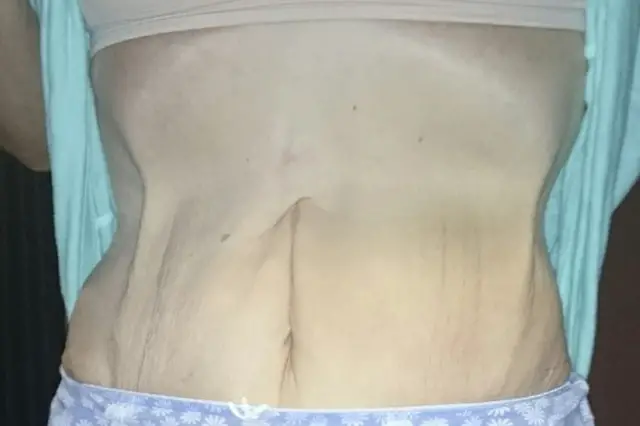An Isle of Wight teenager, in the middle of her GCSEs, has been forced into launching a GoFundMe appeal to raise £2,500 to fund a life changing operation for her very poorly mother.
The story of Connie Jones (read in full here) is staggering.
The mother of four started suffering with crippling pain in April 2015 and after a series of delays, a number of trips to the hospital (during which she was prescribed Ketamine and Morphine), it was eventually discovered (only after her husband insisted they look a second time at the CT scan) that Connie had suffered a Petersen Hernia – her bowel had slipped and became constricted, knotted and was strangulated of blood flow.
She was rushed by air ambulance to Queen Alexandra hospital in Portsmouth where she underwent surgery. All went well, the bowel was saved.
The impact of the surgery
However, when she should be been recovering, the pain got worse and after seeing ‘countless doctors’ it was concluded that the surgeon had stitched Connie up incorrectly. Having previously lost 15 stone, Connie now has an excess of loose skin and it has been said that the surgeon didn’t take account of this when stitching Connie back up.
Victoria says,
“He had attached the loose skin higher up than it had previously been before the operation, and the loose skin was hanging from one point on the abdominal wall (as the picture shows). So, it has ended up that Connie has an estimate of around 2-3kg hanging from one piece of scar tissue left over from the operation.
“Along the way, she faced serious swelling around the scar site and in her legs, which caused her more pain as it pulled on the scar. A large adhesion which meant that certain foods would irritate it and make her bowel swell to the point that it looked as though she was 6 months pregnant.
“As a result of all of the swelling, she was prescribed a water balance medication to help balance it out, yet it has only led to her potassium levels dropping dangerously low.
“The Morphine and the Ketamine caused her to fall asleep with a hot water bottle on her leg, and she didn’t feel it until it had burnt through to the muscle. The burn now has an infection in it which is gradually getting worse, yet she couldn’t (and still can’t) go up to the hospital because it simply causes too much pain to travel.”
Corrective surgery refused, say family
The family say that despite a plastic surgeon claiming an operation to correct the problem would be so easy that he could slot her in between his more major operations and Connie’s pain consultant warning that remaining on high strength painkillers was dangerous for her, on 8th February the CCG rejected the request for corrective surgery.
Yes, according to Victoria, the CCG have refused to approve surgery to correct a painful and life changing problem that was caused during the original emergency surgery.
Please help
In the meantime, Victoria says,
“I am appealing to you, as a teenage girl trying to bring her mother back from the horrific ordeal that she has suffered. Give her some hope, a port in the storm.”
Victoria hopes to raise £2,500 in order for her mother to have the surgery to correct the problems caused during surgery last year.
You can help by donating via the GoFundMe page.
CCG: We’ve got to be careful with our money
A spokesperson for the IW CCG told OnTheWight,
The Isle of Wight Clinical Commissioning Group (CCG) is unable to provide details of individual cases but can confirm that the case involving Mrs Jones is currently part of an ongoing individual funding process.
Part of this process provides the opportunity for patients to appeal through their GP or Consultant against decisions made by the Individual Funding Panel if they are not satisfied with the outcome.
The CCG has a limited fund to spend on healthcare for the Isle of Wight. We must therefore ensure that every pound spent on healthcare is well spent.
The CCG has a list of interventions and treatments that it has classified as ‘low priority’ and would not normally be available to NHS patients, unless there are exceptional circumstances.
Providers of health care are informed that such procedures or medication will not usually be funded. The reasons for classification as low priority can be because the intervention or treatment is of unproven benefit, that it is a purely cosmetic procedure, or the costs associated with it are not outweighed by the benefits it brings to patients.
A referral system is available in the form of the Individual Funding Request (IFR) panel in which the CCG will consider funding a low priority procedure/medication if it can be justified on grounds of exceptional need.
The application for this is made by a GP or consultant on behalf of his / her patient. If refused by the IFR Panel there is an appeal mechanism for review of the IFR panel’s decision. Further information can be found on the CCG website.
Article edit
Comment from the CCG added





